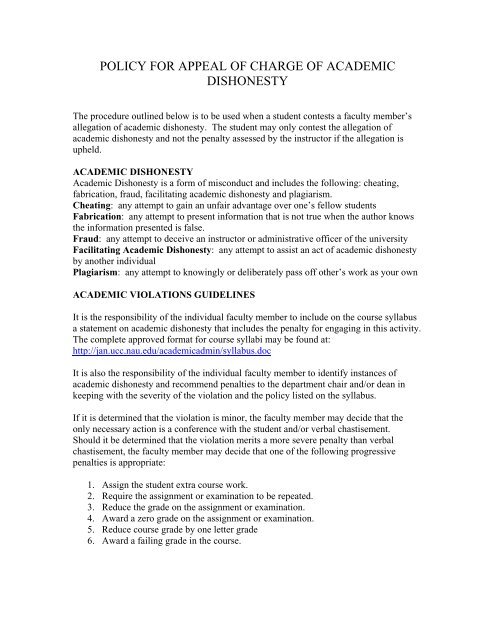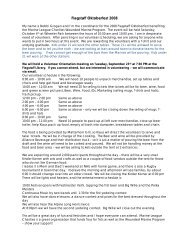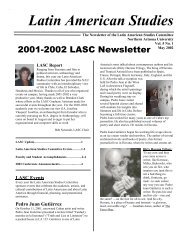Academic Dishonesty & Appeal policy - College of Arts and Letters
Academic Dishonesty & Appeal policy - College of Arts and Letters
Academic Dishonesty & Appeal policy - College of Arts and Letters
Create successful ePaper yourself
Turn your PDF publications into a flip-book with our unique Google optimized e-Paper software.
POLICY FOR APPEAL OF CHARGE OF ACADEMICDISHONESTYThe procedure outlined below is to be used when a student contests a faculty member’sallegation <strong>of</strong> academic dishonesty. The student may only contest the allegation <strong>of</strong>academic dishonesty <strong>and</strong> not the penalty assessed by the instructor if the allegation isupheld.ACADEMIC DISHONESTY<strong>Academic</strong> <strong>Dishonesty</strong> is a form <strong>of</strong> misconduct <strong>and</strong> includes the following: cheating,fabrication, fraud, facilitating academic dishonesty <strong>and</strong> plagiarism.Cheating: any attempt to gain an unfair advantage over one’s fellow studentsFabrication: any attempt to present information that is not true when the author knowsthe information presented is false.Fraud: any attempt to deceive an instructor or administrative <strong>of</strong>ficer <strong>of</strong> the universityFacilitating <strong>Academic</strong> <strong>Dishonesty</strong>: any attempt to assist an act <strong>of</strong> academic dishonestyby another individualPlagiarism: any attempt to knowingly or deliberately pass <strong>of</strong>f other’s work as your ownACADEMIC VIOLATIONS GUIDELINESIt is the responsibility <strong>of</strong> the individual faculty member to include on the course syllabusa statement on academic dishonesty that includes the penalty for engaging in this activity.The complete approved format for course syllabi may be found at:http://jan.ucc.nau.edu/academicadmin/syllabus.docIt is also the responsibility <strong>of</strong> the individual faculty member to identify instances <strong>of</strong>academic dishonesty <strong>and</strong> recommend penalties to the department chair <strong>and</strong>/or dean inkeeping with the severity <strong>of</strong> the violation <strong>and</strong> the <strong>policy</strong> listed on the syllabus.If it is determined that the violation is minor, the faculty member may decide that theonly necessary action is a conference with the student <strong>and</strong>/or verbal chastisement.Should it be determined that the violation merits a more severe penalty than verbalchastisement, the faculty member may decide that one <strong>of</strong> the following progressivepenalties is appropriate:1. Assign the student extra course work.2. Require the assignment or examination to be repeated.3. Reduce the grade on the assignment or examination.4. Award a zero grade on the assignment or examination.5. Reduce course grade by one letter grade6. Award a failing grade in the course.
If the academic dishonesty occurs prior to the last withdrawal date <strong>of</strong> the semester, thefaculty member may require the student to remain enrolled in the course.Before taking action on a penalty, the faculty member must notify the department chair<strong>and</strong>/or dean <strong>of</strong> the incident <strong>and</strong> contact the Associate Provost for <strong>Academic</strong>Administration for any record <strong>of</strong> previous academic dishonesty. The severity <strong>of</strong> thepenalty may depend on the nature <strong>of</strong> the infraction, the degree to which the academicproject involved affects the course grade, <strong>and</strong> the past record <strong>of</strong> academic dishonesty <strong>of</strong>the student.If the student has a past record <strong>of</strong> academic dishonesty, the minimum penalty shall be afailing grade in the academic project connected with the violation. In addition, thefaculty member may, through appropriate departmental channels, recommend actionsmore severe than those listed above such as suspension, <strong>and</strong>/or dismissal from theuniversity. Any request <strong>of</strong> this nature will be coordinated with the Office <strong>of</strong> Student Life.WRITTEN DOCUMENTATION OF THE PENALTY IMPOSED AT ANY LEVELMUST BE FORWARDED TO THE ASSOCIATE PROVOST FOR ACADEMICADMINISTRATIONDefinitions:“Meeting” is defined by the presence <strong>of</strong> all parties to the appeal either physically in onelocation or via electronic means.“Designated Administrator” refers to the individual in charge <strong>of</strong> carrying out the specificstep <strong>of</strong> the process. Generally this will be an assistant/associate dean, department chair ordirector. Terminology varies among the academic units.“Appellant” is the individual bringing the appeal to the <strong>College</strong>-level Committee or theASC Sub-committee. In most cases this will be the student, but it could be a facultymember if the decision in Steps 2 or 3 was in favor <strong>of</strong> the student.“Statement <strong>of</strong> Denial” is a written record <strong>of</strong> the specific reasons why the student iscontesting the charge <strong>of</strong> academic dishonesty.“Statement <strong>of</strong> Evidence” is a written statement by the faculty <strong>of</strong> the actions <strong>of</strong> the studentwhich constitute academic dishonesty.Procedures for <strong>Appeal</strong> <strong>of</strong> Charge <strong>of</strong> <strong>Academic</strong> <strong>Dishonesty</strong>Step 1Upon being notified by an instructor that he/she is being is being charged with academicdishonesty, a student has two options. The student may accept the allegation <strong>and</strong> thepenalty the pr<strong>of</strong>essor assesses for the infraction or the student may contest the allegation<strong>of</strong> academic dishonesty. The student may not contest the penalty assessed by thepr<strong>of</strong>essor. If the student contests the allegation <strong>of</strong> academic dishonesty, the student mustnotify the pr<strong>of</strong>essor in writing within two weeks <strong>of</strong> the initial notification <strong>of</strong> the charge <strong>of</strong>the intent to contest the allegation.
Step 2:Following receipt <strong>of</strong> the written communication from the student, a student, instructor<strong>and</strong> designated administrator meeting must be held. The instructor is responsible forsetting up this meeting which must be held within one week <strong>of</strong> the receipt <strong>of</strong> the writtennotification <strong>of</strong> appeal unless the designated administrator is unavailable. The studentmay bring a silent observer to this meeting provided the instructor <strong>and</strong> designatedadministrator are notified no less than two working days prior to the meeting.At the meeting the student must present to the designated administrator a written“Statement <strong>of</strong> Denial” refuting the charges <strong>of</strong> academic dishonesty. At the conclusion <strong>of</strong>this meeting the designated administrator <strong>and</strong> faculty member will conference without thestudent <strong>and</strong> then announce to the student their decision. In addition a letter shall be sentby the designated administrator to the student <strong>and</strong> the faculty member documenting themeeting <strong>and</strong> confirming the decision that was made. This letter constitutes the <strong>of</strong>ficialminutes <strong>of</strong> the meeting <strong>and</strong> shall include a copy <strong>of</strong> the student’s “Statement <strong>of</strong> Denial.”The designated administrator may affirm or dismiss the charge <strong>of</strong> academic dishonesty.The designated administrator may not change the penalty assessed by the pr<strong>of</strong>essorwithout the pr<strong>of</strong>essor’s acceptance <strong>of</strong> this change.If the instructor <strong>of</strong> the course is a department chair or the administrator <strong>of</strong> the academicunit, Step 2 <strong>of</strong> the process is conducted by a Dean-designated administrator within the<strong>College</strong>.If this meeting does not produce satisfaction, the student or faculty member has twoweeks to notify, in writing, the Dean <strong>of</strong> the <strong>College</strong> <strong>of</strong> the intent to proceed to Step 3.This request must be in writing. If the appeal is initiated by the student it must beaccompanied by the “Statement <strong>of</strong> Denial” presented to the Designated Administrator inStep 2. If the appeal is initiated by the faculty member, it must be accompanied by a“Statement <strong>of</strong> Evidence” to be prepared by the faculty member.Step 3:Upon receiving a request from the student or faculty member, the college Dean ordesignee will appoint <strong>and</strong> convene, within two weeks <strong>of</strong> receiving the appeal from thestudent, an ad hoc committee composed <strong>of</strong> the persons listed below to hear the appeal.The student <strong>and</strong>/or the instructor may present additional written statements supportinghis/her position up to one week prior to the Committee meeting. Requests forinformation by either the student or instructor must be made to the Committee chair. Ifthe request is a violation <strong>of</strong> confidentiality, the Committee chair must deny the request.If the Committee chair considers a request to be a potential violation <strong>of</strong> confidentiality,he/she should contact the Associate Provost for <strong>Academic</strong> Administration (APAA) forfinal resolution <strong>of</strong> the request. No material may be presented less than five working daysprior to the meeting <strong>of</strong> the ad hoc committee. No new material may be presented at theCommittee meeting.
All materials submitted by the student <strong>and</strong> instructor must be given to the individualdesignated as the Chair <strong>of</strong> the ad hoc committee. Committee members, student <strong>and</strong>instructor must receive all materials no later than two working days prior to the meeting.The minutes <strong>of</strong> the Student/Instructor/Designated Administrator meeting will beforwarded to the Chair <strong>of</strong> the ad hoc committee. During the Committee meeting, thestudent <strong>and</strong> faculty member will be given full opportunity to present their positions.The dean's ad hoc committee shall consist <strong>of</strong>:a. Dean <strong>of</strong> the college, or designee, who chairs the committee. This individual mustbe different from the individual who served as the designated administrator in step2;b. Two faculty members from the department in which the course being appealed is<strong>of</strong>fered. If two faculty members from the department cannot be found, facultyfrom other academic units in the college/school may be appointed;c. Two faculty members from an academic unit outside the department in which thecourse being appealed is <strong>of</strong>fered. These faculty members may come from thesame college/school as the department in which the course is being appealed orthey may come from a different college/school;d. The ASNAU senator, or designee, that is the representative <strong>of</strong> that college/school.If this individual is not available, the Chair <strong>of</strong> this Committee may appointanother student to fulfill this role.e. The Associate Provost for <strong>Academic</strong> Administration (or designee) in an advisorycapacity.Process to be followed by the ad hoc Committee:It is required that all parties to the academic dishonesty appeal be present in person or viaelectronic means during the fact finding phase <strong>of</strong> the meeting. The student <strong>and</strong>/orinstructor may bring a silent observer to this Committee hearing provided the chair <strong>of</strong> thecommittee is notified no less than two working days prior to the meeting.Format for <strong>College</strong>-level Allegation <strong>of</strong> <strong>Academic</strong> <strong>Dishonesty</strong> <strong>Appeal</strong> Hearing:Introduction <strong>of</strong> Committee membersCharge to Committee by ChairProcess Statement by Provost Office Representative – presented orallyPresentation <strong>of</strong> Information by StudentPresentation <strong>of</strong> Information by InstructorQuestions from Committee MembersResponse to instructor presentation by studentResponse to student presentation by instructorQuestions from Committee MembersMeeting Ending Statement by ChairDeliberations <strong>and</strong> VoteThe fact finding phase <strong>of</strong> the meeting should generally last between 30 <strong>and</strong> 45 minutes.
The chair shall vote only in the event <strong>of</strong> a tie. Minutes <strong>of</strong> the meeting shall be taken bysomeone other than the person chairing the meeting <strong>and</strong> shall be prepared in summaryform. These minutes are kept in the <strong>of</strong>fice <strong>of</strong> the Dean; a copy is forwarded to therepresentative from the Provost’s Office. The student <strong>and</strong> instructor will be sent copies <strong>of</strong>the minutes <strong>and</strong> may propose corrections to the minutes before they are released to anyparty outside <strong>of</strong> the Committee.It is recommended that the fact finding portion <strong>of</strong> the meeting in which the student <strong>and</strong>instructor present their information be taped. No taping <strong>of</strong> the Committee’s deliberationsis allowed. The tape will be retained in the Office <strong>of</strong> the Dean <strong>and</strong> disposed <strong>of</strong> accordingto Arizona Statutes on Records Retention. The Chair <strong>of</strong> the ad hoc Committee will senda letter to the student <strong>and</strong> instructor indicating the decision <strong>of</strong> the committee, <strong>and</strong> therationale behind this decision.Step 4:Should either the student or the instructor believe violations <strong>of</strong> due process occurred atany step <strong>of</strong> the appeal, the matter may be appealed in writing to the Office <strong>of</strong> the Provost.The only grounds for appeal to the Provost’s Office are violations <strong>of</strong> the due processcontained with this <strong>policy</strong>. The appeal must contain a description <strong>of</strong> the processes whichwere not followed.The Provost will forward the appeal to the Associate Provost for <strong>Academic</strong>Administration who will send it to the Chair <strong>of</strong> the <strong>Academic</strong> St<strong>and</strong>ards Committee(ASC) who shall be responsible for calling a meeting <strong>of</strong> a subcommittee <strong>of</strong> the ASCcomposed <strong>of</strong> at least six individuals. Both the student <strong>and</strong> instructor must be notified inwriting <strong>of</strong> the hearing at this level <strong>and</strong> the procedures to be followed.At a meeting specifically scheduled to consider only the appeal, the ASC sub-committeewill conduct a review <strong>of</strong> the appeal process in question. The ASC sub-committee mayinvite the appellant <strong>and</strong> other relevant individuals to the hearing if it decides theindividuals’ presence is required to provide the information necessary for the subcommitteeto make an informed decision.Format for ASC Sub-committee <strong>Academic</strong> <strong>Dishonesty</strong> <strong>Appeal</strong> HearingWhen no outside parties are presentCharge to Committee by Chair <strong>of</strong> Sub-committeeReview <strong>of</strong> the “Statement <strong>of</strong> Denial” submitted by the studentReview <strong>of</strong> <strong>College</strong> Committee MinutesCommittee Discussion, Deliberations <strong>and</strong> Vote
Format for ASC Sub-committee <strong>Academic</strong> <strong>Dishonesty</strong> <strong>Appeal</strong> HearingWhen One or more Invited Individuals are PresentCharge to Committee by Chair <strong>of</strong> Sub-committeeReview <strong>of</strong> “Statement <strong>of</strong> Denial” submitted by the studentReview <strong>of</strong> <strong>College</strong> Committee MinutesPresentation <strong>of</strong> Information by StudentPresentation <strong>of</strong> Information by Pr<strong>of</strong>essorQuestions from Committee MembersResponse to Pr<strong>of</strong>essor presentation by StudentResponse to Student presentation by Pr<strong>of</strong>essorQuestions from Committee MembersCommittee Discussion, Deliberations <strong>and</strong> VoteThe decision reached by the ASC Sub-committee will be communicated to the Student,the Pr<strong>of</strong>essor <strong>and</strong> the college Dean.The decision reached by the ASC Sub-committee shall become a matter <strong>of</strong> Universityrecord in the Office <strong>of</strong> the Associate Provost for <strong>Academic</strong> Administration. This decisionshall be final <strong>and</strong> end any further campus involvement. There is no appeal beyond thislevel.Approved:<strong>Academic</strong> St<strong>and</strong>ards Committee April 28, 2006__________________________Liz Grobsmith, Provost June 19, 2006





